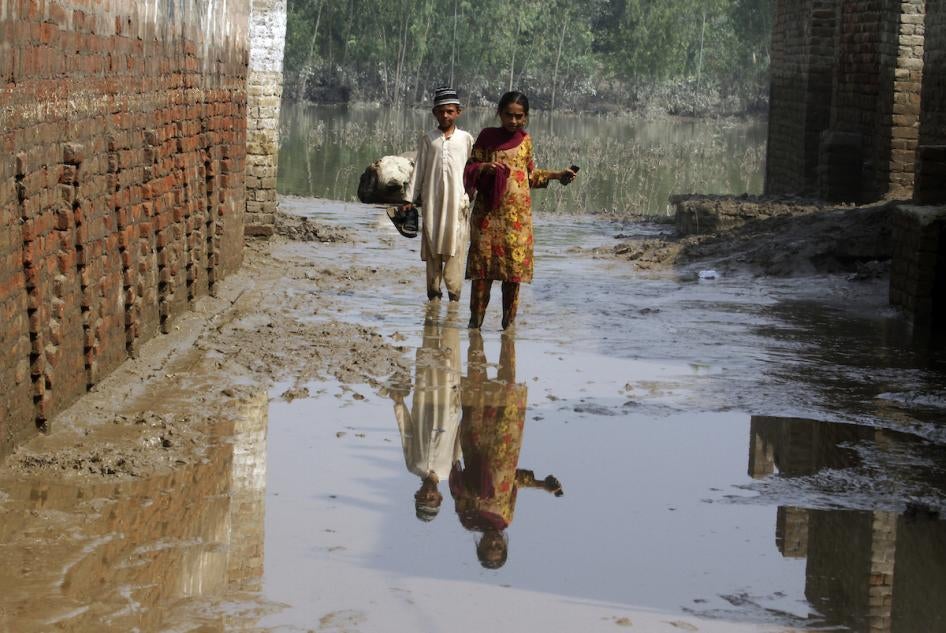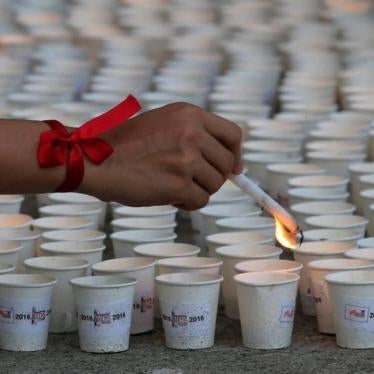Human Rights Watch welcomes the opportunity to provide input regarding the draft general comment on children’s rights and the environment, with a special focus on climate change, issued by the Committee on the Rights of the Child (“the Committee”). We hope this will inform the Committee as it finalizes the General Comment.
We particularly appreciate that children’s views were sought and included in the draft general comment, and that the right to a healthy environment is explicitly recognized, along with the transboundary obligations of states in relation to the environment generally and climate change specifically. We also appreciate that a life-course approach is taken regarding the right of children to survive, grow, and develop.
However, Human Rights Watch finds that provisions on state obligations related to climate change could and should be strengthened, and the urgency of the global environmental crisis be expressed more clearly. Human Rights Watch also finds gaps on sexual and reproductive rights, disability rights, the right to education, the right to a clean, healthy, and sustainable environment, and the human rights responsibilities of businesses. We therefore propose several additions and amendments.
The Rights to Health, Survival, and Development (Sections III.A. and III.B.)
In utero exposures to chemicals, extreme heat, natural disasters, and air pollution, among others, can lead to birth conditions that may lead to disabilities, preterm birth, low birth weight, and other adverse birth outcomes. A newborn’s right to health could be undermined even without additional postnatal exposures to adverse environmental conditions because of exposure to environmental harms during pregnancy. Moreover, preterm birth, low birth weight, and other adverse birth outcomes are major causes of infant deaths and can lead to poorer health outcomes across the lifespan, including during and, in some cases, especially during childhood. Preterm birth and low birth weight, for example, are especially dangerous in low- and middle-income countries where many families do not have access to comprehensive neonatal care.[1] Urgent action is needed to arrest rising preterm birth rates in many countries, including through improved environmental health.
The current draft general comment usefully takes a “life-course” approach to implications of environmental crises on children’s health and wellbeing. A stronger version would explicitly note the extensive scientific literature that shows that pregnant people and the developing fetus are especially vulnerable to poor environmental health. Failing to include information about intrauterine impacts means failing to acknowledge how child health and sexual and reproductive health and rights, including the right to a healthy pregnancy, are intimately intertwined, and that children’s right to protection from environmental harms, including the climate crisis, toxics, and endocrine-disrupting chemicals, to name a few, necessitates better protections to adult health, maternal health, and sexual and reproductive rights more broadly.
Human Rights Watch also suggests that a more complete depiction of children’s right to health, including in a report focused on the environment, would include access to sexual and reproductive health, including safe abortion care, for children, where needed.
Please see suggested additions below:
- Para 21: We recommend explicitly acknowledging the increased vulnerability of the fetal development period.[2] We also suggest saying that states should consider the impact of exposure to toxic substances and pollution on pregnant people, including the developing fetus, and in early life.
- Para 25: We recommend adding that climate change can worsen access to nutrition and exposure to extreme heat, wildfire, and other extreme weather events for pregnant people, which may result in poor birth outcomes such as preterm birth or low birthweight. The latter increase risk of infant death and can have lifelong health consequences.[3] Maternal exposure to some toxics such as heavy metals is linked to birth conditions that can lead to disabilities that may be physical, intellectual, or developmental.[4] Maternal exposure to air pollution is linked to neurological harms to the fetal brain, with lifelong consequences for children.[5]
- Para 26: We recommend highlighting that in utero exposure to air pollution, extreme heat, wildfire smoke, and toxics like lead, for example, are linked with preterm or low birth weight, both major contributors to infant mortality, and linked with lifelong poor health, including during childhood. Research found air pollution is linked to 20 percent of newborn deaths mostly because of babies born preterm or low birth weight.[6]
The Right to Education (Section III. C.)
We recommend including reference to the growing need for better education and information on how poor environmental health adversely impacts human health, including sexual and reproductive health—for example, the impacts of endocrine-disrupting chemicals on early menarche and fertility, and pregnancy health. In particular, we recommend the following:
- Para 33: Education should include comprehensive sex education that includes information about environmental harms on sexual and reproductive health, including harms to healthy pregnancies, human fertility, and endocrine disrupting hormones’ impacts across the life course, including on puberty and sexual development, as well as information on contraceptive choice and available and accessible safe abortion services.
We also recommend adding that states should ensure access to high quality education to children who have migrated or are displaced in the context of climate- or environment-related events, without discrimination.
The Right to a Clean, Healthy, and Sustainable Environment (Section IV)
- Para 73 d: We recommend calling for the rapid phasing out of extraction, production, and use of fossil fuels by investing in regenerative economies utilizing localized, renewable, and sustainable sources of energy, including accessible and affordable public transit, walkable and liveable cities, and increased energy efficiency to address the children’s rights harms associated with fossil fuel pollution and the climate crisis.
Children’s Rights and the Climate Crisis (Section VI)
The General Comment should provide much-needed authoritative guidance relating to children’s rights and the climate crisis. Human Rights Watch welcomes the draft’s view that states have obligations to take actions to protect children’s rights against the foreseeable effects of climate change, and to mobilize the maximum available resources for mitigation and prevention measures. It also supports the draft’s view that home states should adopt measures to address current harm and foreseeable climate-related risks to children’s rights posed by business enterprises that have transboundary effects when there is a reasonable link between the state and the conduct concerned, and that states should provide effective remedies for infringements.
However, the draft could be made considerably stronger in this regard. Human Rights Watch proposes the following:
- Para 102: We recommend focusing on the goal of 1.5 degrees, in line with the latest available research and the Paris Agreement. While the 2015 Paris Agreement sets the goal to limit warming to “well below 2 degrees Celsius,” new scientific research by the Intergovernmental Panel on Climate Change (IPCC) has found that a 2 degree increase in temperature would have severe and often irreversible consequences.[7] It has also found that existing fossil fuel projects are already more than the climate can withstand if we are to meet this goal.[8]
- Para 105: We recommend underlining the importance for states to include intersectional experiences into their national adaptation plans, including the situations of children with disabilities. Under the Convention on the Rights of Persons with Disabilities, governments should ensure equal rights for children with disabilities as well as their protection and safety during extreme weather events.[9] Studies show that most countries are falling far short of including the rights of people with disabilities, including children with disabilities, in their climate adaptation plans.[10]
The General Comment should also clarify that situations of poverty and marginalization can exacerbate the situation of families that have children with disabilities during climate-related disasters.[11] Poverty and marginalization may impact access to vital services, such as water, food, health services and shelter. At the same time, economic and social status play a significant role in the ability of families with children with disabilities to adapt to climate change and stay safe during extreme weather events.
- Para 111: We recommend adding that all states should immediately work to achieve a phase out of fossil fuels as sources of income, energy, and transportation. Wealthy nations should immediately support low-income nations in the equitable transition to localized, renewable, sustainable, and accessible sources of energy.
- Para 111e: We recommend explicitly excluding carbon capture and storage as viable possibilities to mitigate climate change in line with human rights. Mitigation measures should not rely on technologies that have not yet proven to be effective and carry significant risks for human rights, as outlined in academic publications. [12]
- Para 112: We recommend saying that states should stop providing fossil fuel subsidies and other incentives, as these violate government human rights obligations related to climate change. As a minimum, we suggest deleting “consider.”
Finally, we recommend including clear language on the common but differentiated responsibilities of states in relation to mitigation measures. It remains unclear in the draft what the minimum threshold for a “fair share” of mitigation efforts is from a child rights perspective.
Child Rights and Business (Sections V.F. and VI.D.)
- Para 92: We welcome the draft’s statement that “States should require business to undertake child-rights due diligence.” However, the text states that businesses should conduct due diligence “across their business relationships and within global operations”; instead, it would be preferable to say, “across businesses’ entire supply chains,” as the terms “business relationships” and “global operations” are ambiguous.
- Para 115: With regard to climate change, we recommend explicitly saying that states should require businesses to measure their total Scope 1, 2, and 3 carbon footprint; set targets for reducing all three greenhouse gas emissions in line with the 1.5 degrees goal of the Paris Agreement (excluding the use of carbon offsetting and carbon capture and storage); and steer their activities to reduce direct and indirect greenhouse gas emissions to align with the target.
We also recommend adding language on businesses’ responsibility to be transparent. In particular, the General Comment should explicitly state that states should require businesses to publicly disclose their child rights due diligence measures, including their policies, risks identified, steps taken to address the risks, audit summaries, non-compliances found, and grievance reports received. States should also require companies to disclose information about their supply chain, such as the names and locations of their suppliers.
Finally, states should make particular efforts to protect the rights of children living in communities on the frontlines of fossil fuel and other polluting operations.
International Cooperation (Section V.G.)
- Para 95: We recommend specifying that high-income states should support adaptation and mitigation efforts in developing countries by facilitating the rapid phase out of fossil fuels via the transfer of green technologies, and by contributing to financing the transition from fossil fuel-based economies to economies based on the use and adoption of renewable, sustainable, localized sources of energy, climate mitigation and adaptation, in line with their internationally agreed climate finance goals.
[1] See for example World Health Organization, Preterm Birth, November 14, 2022. “In low-income settings, half of the babies born at or below 32 weeks (2 months early) die due to a lack of feasible, cost-effective care such as warmth, breastfeeding support and basic care for infections and breathing difficulties. In high-income countries, almost all these babies survive. Suboptimal use of technology in middle-income settings is causing an increased burden of disability among preterm babies who survive the neonatal period.” https://www.who.int/news-room/fact-sheets/detail/preterm-birth#:~:text=An%20estimated%2015%20million%20babies%20are%20born%20too%20early%20every,and%20visual%20and%20hearing%20problems (accessed February 6, 2023).
[2] Patrice Sutton et al., “Reproductive environmental health,” Current opinion in obstetrics & gynecology, vol. 22,6 (2010): 517-24. doi:10.1097/GCO.0b013e3283404e59; see also World Health Organization, Children’s Environmental Health, https://www.who.int/health-topics/children-environmental-health#tab=tab_1.
[3] Intergovernmental Panel on Climate Change (IPCC), Climate Change 2022: Impacts, Adaptation and Vulnerability, Contribution of Working Group II to the Sixth Assessment Report of the Intergovernmental Panel on Climate Change, 2022, https://www.ipcc.ch/report/ar6/wg2/; and Roos N, Kovats S, Hajat S, et al., “Maternal and newborn health risks of climate change: A call for awareness and global action,” Acta Obstet Gynecol Scand. 2021;100(4):566-570, doi:10.1111/aogs.14124.
[4] For example, Lin, Zhiqing et al., “Individual heavy metal exposure and birth outcomes in Shenqiu county along the Huai River Basin in China,” Toxicology research vol. 7,3 444-453, March 7, 2018, doi:10.1039/c8tx00009c; see also World Health Organization, “Birth Defects,” February 28, 2022, https://www.who.int/news-room/fact-sheets/detail/birth-defects.
[5] Nancy L. Fleischer et al., “Outdoor Air Pollution, Preterm Birth, and Low Birth Weight: Analysis of the World Health Organization Global Survey on Maternal and Perinatal Health,” Environmental Health Perspectives 122, no. 4, April 2014, pp. 425–30, https://doi.org/10.1289/ehp.1306837; and Sandie Ha, “Air pollution and neurological development in children,” Developmental Medicine and Child Neurology, 63: 374-381, 2021, https://doi.org/10.1111/dmcn.14758.
[6] State of the Global Air 2020, Health Effects Institute, 2020, https://www.stateofglobalair.org/sites/default/files/documents/2022-09/soga-2020-report.pdf, p.23.
[7] IPCC, Climate Change 2022: Impacts, Adaptation and Vulnerability; see also Kelly Levin, Sophie Boehm, and Rebecca Carter, “6 Big Findings from the IPCC 2022 Report on Climate Impacts, Adaptation and Vulnerability,” World Resources Institute, February 27, 2022, https://www.wri.org/insights/ipcc-report-2022-climate-impacts-adaptation-vulnerability.
[8] IPCC, Climate Change 2022 Mitigation of Climate Change, Working Group III Contribution to the Sixth Assessment Report of the Intergovernmental Panel on Climate Change, 2022, https://www.ipcc.ch/report/ar6/wg3/downloads/report/IPCC_AR6_WGIII_SPM.pdf. In 2022, GHG emissions from fossil fuels reached an all-time high.
[9] See Office of the United Nations High Commissioner for Human Rights (OHCHR), “The impact of climate change on the rights of persons with disabilities,” https://www.ohchr.org/en/climate-change/impact-climate-change-rights-persons-disabilities; and “Analytical study on the promotion and protection of the rights of persons with disabilities in the context of climate change,” Report of the OHCHR, April 2020, https://documents-dds-ny.un.org/doc/UNDOC/GEN/G20/097/56/PDF/G2009756.pdf?OpenElement.
[10] International Disability Alliance, Status Report on Disability Inclusion in National Climate Commitments and Policies, June 2022, https://www.internationaldisabilityalliance.org/sites/default/files/drcc_status_report_english_0.pdf.
[11] Human Rights Watch, Leave No One Behind: People with Disabilities and Older People in Climate-Related Disasters (New York: Human Rights Watch, 2022), https://www.hrw.org/news/2022/11/07/leave-no-one-behind.
[12] Günther, Philipp, and Felix Ekardt, “Human Rights and Large-Scale Carbon Dioxide Removal: Potential Limits to BECCS and DACCS Deployment,” Land 11, no. 12: 2153, 2022, https://doi.org/10.3390/land11122153.








